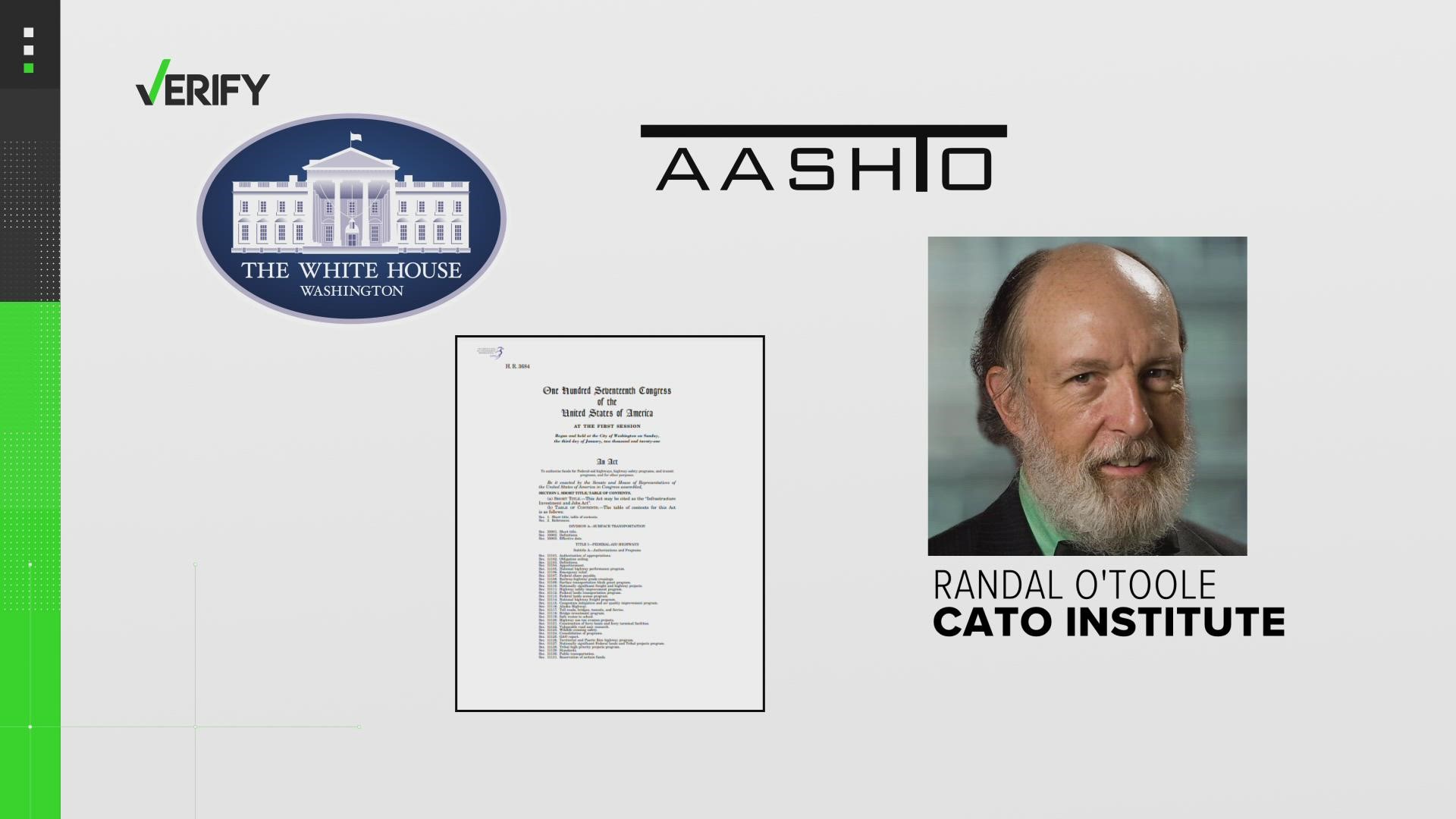WASHINGTON — From repairing roads and improving cybersecurity to building bridges and improving water quality, America's infrastructure is getting overhauled with an influx of federal funds.
The price tag? A whopping $1.2 trillion.
"Will Washington, D.C. get money from the federal infrastructure bill since we are not a state?" a Verify viewer asked. "If so, how much?"
We Verified, not just for D.C., but for the entire DMV region.
THE QUESTION:
How much money from the Infrastructure Investment and Jobs Act, will go to projects in the D.C. region?
THE SOURCES:
- Infrastructure Investment and Jobs Act (H.R.3684)
- The White House- fact sheets for D.C., Maryland and Virginia
- Randal O’Toole- senior fellow at the Cato Institute
- American Association of State Highway and Transportation Officials- report
THE ANSWER:
It's difficult to provide an exact amount; however, the DMV is anticipated to receive tens of billions of dollars.
WHAT WE FOUND:
There are two main ways in which the spending package allocated money to states. The first way is based on a series of formulas that take into account traits like population or size. The other method is through grant funding, in which jurisdictions need to compete to receive that funding.
Randal O'Toole from the Cato Institute, says that the formulas are identical to the previous re-authorization bill's, called the FAST Act.
So how much money will D.C., Maryland and Virginia get?
The funding bill provides funding for highways, bridges, public transportation, electric vehicle networks, broadband coverage, cyberattacks and water systems, as well as much more.
Here's a snapshot of what the White House says each jurisdiction will get over the next five years.
For roads ("federal-aid highway apportioned programs"):
- Virginia- $7 billion
- Maryland- $4.1 billion
- District of Columbia- $1.1 billion
For public transportation:
- Virginia- $1.2 billion
- Maryland- $1.7 billion
- D.C.- $1.2 billion
For bridge replacement and repairs:
- Virginia- $537 million
- Maryland- $409 Million
- D.C.- $225 million
For electric vehicle charging network:
- Virginia- $106 million
- Maryland- $63 Million
- D.C.- $17 million
**all have the option to apply for additional grant money
For water infrastructure:
- Virginia- $738 million
- Maryland- $844 million
- D.C.- $355 million
Additionally, the bill earmarked $150 million annually for WMATA through fiscal year 2030, and provides $386 million and $158 million for Virginia and Maryland airports respectively over the next five years.
"This bill is really two bills," O'Toole said. "One bill is the money we're talking about, which is called the 'new money,' and it's about a little less than $600 billion. And the other bill is a reauthorization of 'old money,' money that was going to highways and going into transit and going to ferry boats and things like that."
The re-authorization of federal money to Metro is an example of what O'Toole calls "old money."
"That WMATA money is supposed to help rehabilitate the Metro rail system is nowhere near enough money to rehabilitate it," he said. "They need something like $12 or $15 billion to do all the rehabilitation that they need to do, but it's supposed to match local funds for that rehabilitation."
While estimating total funding is relatively straightforward, discerning how much money specific projects or specific counties will get, is more complex.
"We can figure out exactly how much Virginia is going to get out of each 'pot,' but it still isn't going to tell us the fine-grained details of, for example, how much is going to go to Richmond? How much is going to go to Northern Virginia? How much is going to go to Hampton Roads area and so on?" O'Toole said.
Decisions on how and where to spend those federal dollars are made at the local level.
So we can verify, the infrastructure bill will bring in tens of billions of dollars into the DMV, but we won’t know exactly where and for what projects for a while.

